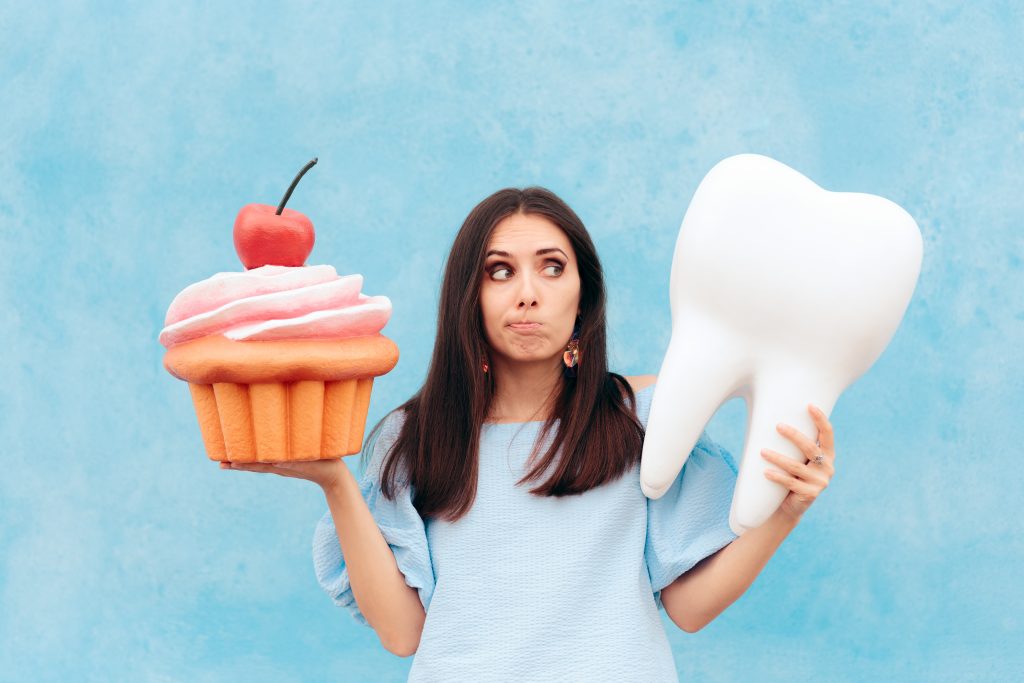 Did you know? Tooth enamel is harder than bone – it’s the toughest tissue in the human body. Yet, our diets, tooth brushing habits, stress, acid reflux, even some mouthwashes can cause dental erosion. When the enamel is weakened, worn down and lost it is considered dental erosion. The good news is dental erosion can be prevented and avoided.
Did you know? Tooth enamel is harder than bone – it’s the toughest tissue in the human body. Yet, our diets, tooth brushing habits, stress, acid reflux, even some mouthwashes can cause dental erosion. When the enamel is weakened, worn down and lost it is considered dental erosion. The good news is dental erosion can be prevented and avoided.
Symptoms
A shiny, glass like appearance of the enamel is the most notable symptom of erosion. If it continues it can lead to broken teeth and decay. You may have one or all of the following symptoms from various causes:
- Sensitivity to extremely hot or cold foods and drinks (especially acids foods and drinks).
- Sensitivity to crunchy or chewy foods.
- Cracks or chips in the teeth.
- A yellowish discoloration from thinning enamel.
- Worn indentations on the cusps (or chewing surfaces) of the teeth.
If erosion goes unrecognized for a periodic of time, it can lead to dental procedures like fillings, veneers and crowns. In severe cases the patient may need a root canal followed by a crown for protection and strength. This is why it it vital that you seek preventive care with routine dental cleanings and exams. Dentists and dental hygienists at Dental Design are trained to recognize early signs and symptoms of dental erosion and provide ways to prevent further erosion.
https://www.instagram.com/p/B2LonarBGJt/?utm_source=ig_web_copy_link
Causes
Dental erosion occurs most often when acidic foods and drinks are consumed, lowering the pH of saliva. When the pH of saliva is lowered it becomes acidic and washes over the teeth providing an acid bath. The acidic saliva etches into the enamel thinning it and wearing it away. We can also damage the enamel with external forces like aggressive tooth brushing or gritting our teeth. We touched on some causes briefly, but what are some more specific causes dental erosion?
- Soft drinks and energy drinks (even ones without added sugars).
- Sugary foods like ice cream and candy.
- Starchy foods like white bread.
- Acidic foods like citrus fruits and berries.
- Fruit drinks and juices (even kombucha).
- Wine, cordials and premixed alcoholic drinks.
- Mouthwashes with alcohol as an ingredient.
- Health conditions like acid reflux and gastroesophageal reflux disease (GERD).
- Stress which causes clenching and grinding of the teeth.
- Brushing with a medium or hard bristled toothbrush or improper brushing habits.
Prevention
Because enamel is not made of living cells it cannot be grown back or repaired. Once enamel is lost, it is gone forever. We need to take inventory of what foods and drinks are going into our bodies and make better choices for a healthy smile that lasts a lifetime. We also need to manage our stress or wear a night guard to prevent wear from clenching and grinding overnight. Also, a soft toothbrush even an electric brush is the best option for home care. When choosing a mouthwash make sure it’s alcohol free. For patients with acid reflux or GERD, it is recommended to swish with water mixed with baking soda to neutralize the acid in your saliva. Remember, prevention is key when it comes to dental erosion.




